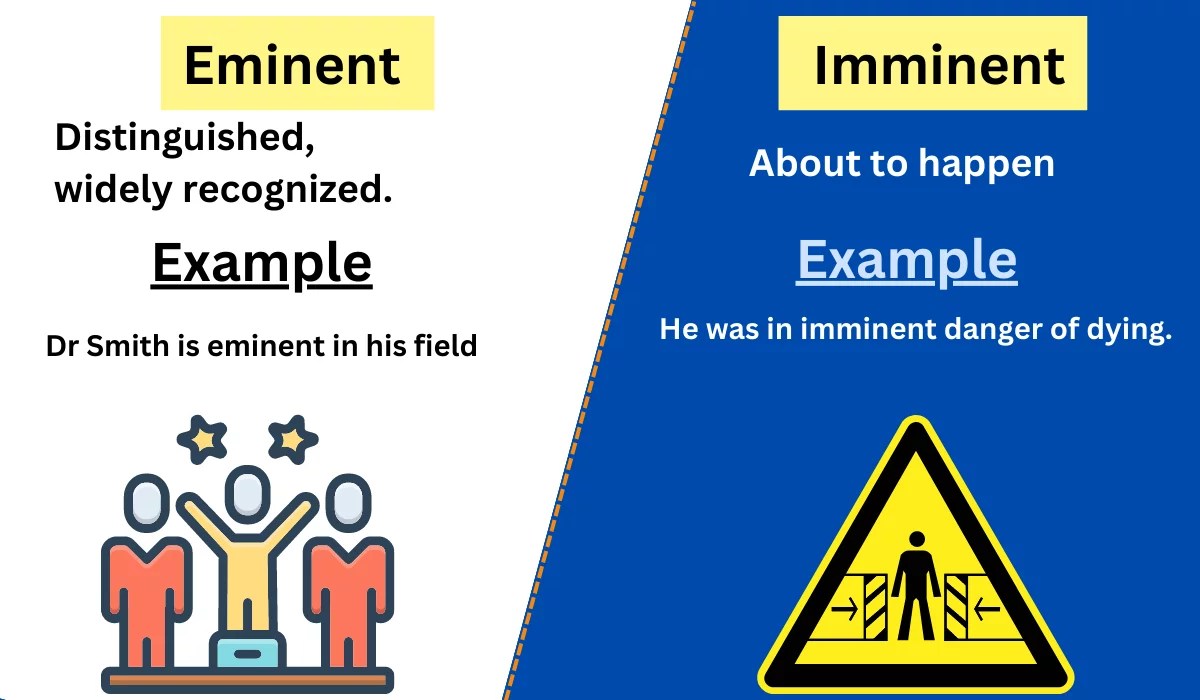In the English language, subtle differences between words can lead to significant misunderstandings. The terms "eminent" and "imminent" often cause confusion due to their similar pronunciations and spellings. However, their meanings diverge dramatically. Understanding these differences is vital for effective communication, whether in writing or conversation. This article will delve into the definitions, usages, and contexts of both words, helping you navigate the intricacies of the English vocabulary.
To clarify the distinction between these two terms, we will explore their origins, meanings, and examples of usage in various contexts. By the end of this article, you will not only know the difference between "eminent" and "imminent" but also be equipped to use them correctly in your own speech and writing. So let us embark on this journey of linguistic discovery and ensure that you never confuse these two words again!
Whether you are a student, a professional, or someone who simply enjoys language, understanding the nuances of words like "eminent" and "imminent" is essential. In a world where communication is key, clarity can make all the difference in conveying your ideas accurately. Let's get started!
What Does "Eminent" Mean?
The term "eminent" is primarily used as an adjective to describe someone or something that is highly regarded, distinguished, or prominent in a particular field. It indicates a level of respect or recognition that sets a person apart from their peers. For example, you might refer to a renowned scientist, an influential artist, or a respected political figure as eminent.
How is "Eminent" Used in Sentences?
Here are a few examples of how "eminent" can be used in sentences:
- Albert Einstein was an eminent physicist whose theories revolutionized our understanding of the universe.
- The eminent historian gave a lecture on the cultural shifts of the 20th century.
- Her contributions to environmental science have made her an eminent figure in the field.
What Does "Imminent" Mean?
On the other hand, "imminent" is also an adjective, but it conveys a sense of urgency or immediacy. It refers to something that is about to happen very soon or is impending. This term is often used in contexts where danger or significant events are on the horizon, such as natural disasters or important announcements.
How is "Imminent" Used in Sentences?
Here are some examples of using "imminent" in sentences:
- The storm warning indicated that severe weather was imminent.
- With the deadline approaching, the team felt the pressure of imminent completion.
- Experts warned that the threat of an earthquake in the region was imminent.
What Are the Key Differences Between "Eminent" and "Imminent"?
While both words sound similar, their meanings are fundamentally different. Here are the key distinctions:
- Eminent refers to a person or thing that is distinguished, respected, or noteworthy.
- Imminent describes something that is about to occur or is impending.
Can Context Help Differentiate "Eminent" from "Imminent"?
Absolutely! The context in which these words are used is crucial for understanding their meanings. For instance, if you hear someone say, "The eminent scientist will present his findings," you can infer that the scientist is respected and recognized in his field. Conversely, if you hear, "The imminent storm is approaching," it suggests that the storm is expected to arrive soon.
Are There Any Common Misuses of "Eminent" and "Imminent"?
Yes, there are common pitfalls when it comes to using these words. Many people mistakenly interchange "eminent" and "imminent" in casual conversation or writing. This can lead to confusion and miscommunication. For example, saying, "The imminent doctor will be seeing patients today," implies that the doctor is about to arrive rather than indicating that the doctor is highly regarded.
How Can You Remember the Difference Between "Eminent" and "Imminent"?
One effective way to remember the difference is to associate "eminent" with "excellence" and "imminent" with "immediacy." By creating a mental link between these concepts, you can more easily recall which word to use in various contexts.
What Are Some Related Words to "Eminent" and "Imminent"?
Understanding related words can enhance your vocabulary and provide further clarity. Here are some synonyms:
- For "eminent": distinguished, notable, renowned, prominent.
- For "imminent": impending, looming, approaching, forthcoming.
Conclusion: Why Knowing "Eminent" vs. "Imminent" Matters?
In summary, understanding the difference between "eminent" and "imminent" is essential for effective communication. By grasping the meanings and contexts of these terms, you can enhance your language skills and avoid common mistakes. Whether you are writing an academic paper, delivering a presentation, or simply engaging in conversation, using the correct terminology can make a significant difference in how your message is received. So, the next time you find yourself pondering "eminent vs imminent," you'll be well-equipped to articulate your thoughts accurately!
You Might Also Like
Understanding The Distinction: Immigrate Vs EmigrateCats Making Biscuits: Understanding This Adorable Behavior
Understanding The Endangerment Of Lions: Are Lions Endangered?
Effective Strategies To Deter Cat Spray
Understanding The Financial Aspects Of Referees Getting Paid
Article Recommendations
- Simon Cowell Is He Still Alive
- Tamilblasters Kannada
- Dorothy Wang Engaged
- Zhao Lusi Age
- Karen Carney Is She Married
- Travis Barker Divorce
- Tony Shalhoub
- Maine Cabin Masters New Season 10
- Kilmer Top Gun
- Mark Harmon Health


